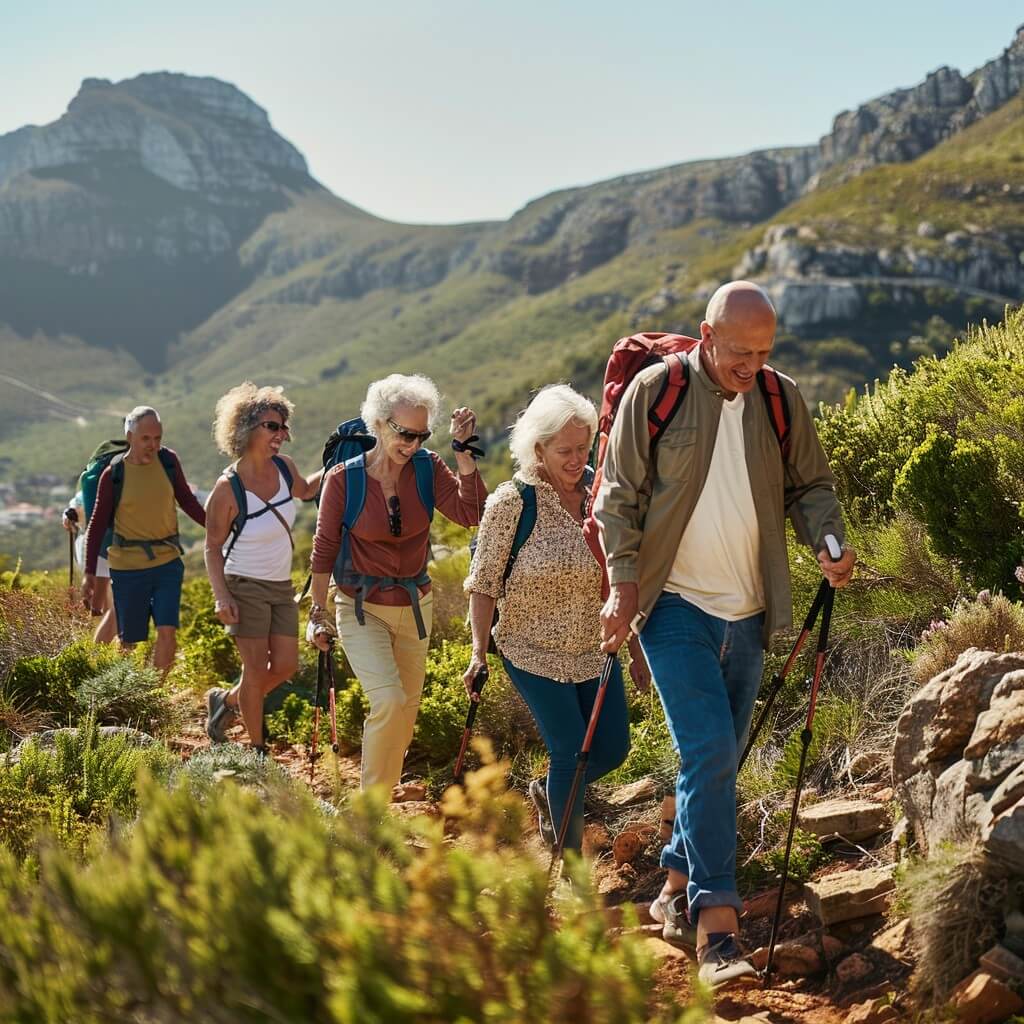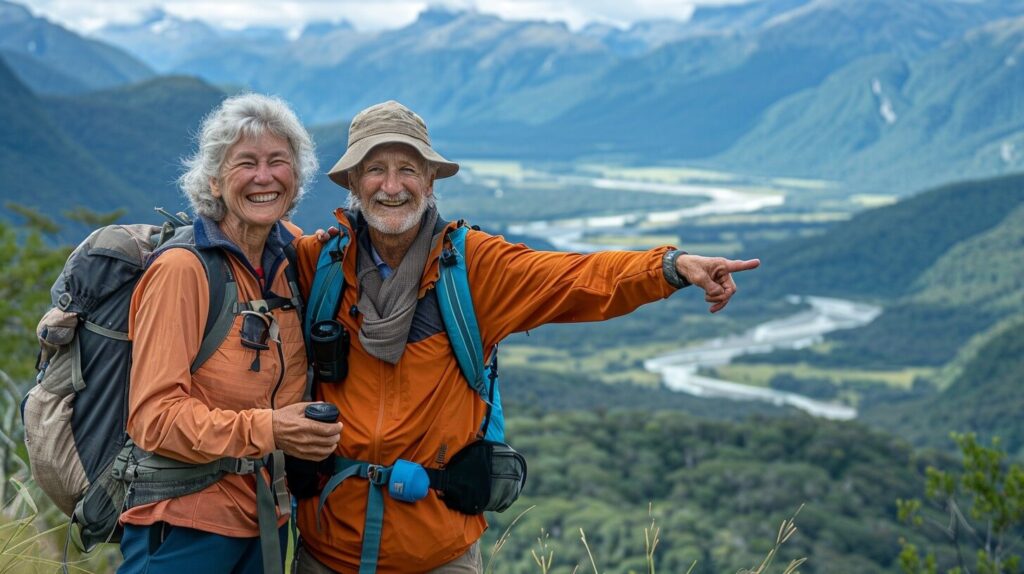
New Zealand is a land of breathtaking beauty, offering a diverse range of natural wonders perfect for exploration.
Whether you’re planning a serene walk through lush forests, a scenic drive along the coast, or a peaceful cruise on a picturesque fjord, this guide is designed to help senior tourists make the most of their visit.
Common Questions and Concerns
Planning a trip to New Zealand can bring up several questions and concerns, especially for senior travellers.
Here are some common ones:
- What are the must-see natural attractions in New Zealand for seniors?
- How accessible are these attractions?
- What should I pack for a comfortable and safe trip?
- Are there senior-friendly tour options available?
- How can I ensure my trip is enjoyable and stress-free?
Let’s dive into each of these questions and provide detailed answers to help you plan your dream trip to New Zealand.
Top Natural Attractions for Senior Tourists
Milford Sound
Known as the “eighth wonder of the world,” Milford Sound offers stunning fjord landscapes with calm waters and towering peaks that make it a must-visit destination.
Tips for Visiting Milford Sound:
- Cruises: One of the best ways to experience Milford Sound is by taking a cruise. These cruises often come with amenities like comfortable seating, refreshments, and even guided commentary to enrich your experience. Look for tours that offer wheelchair accessibility and senior discounts.
- Scenic Flights: For a truly unforgettable experience, consider taking a scenic flight over Milford Sound. These flights offer a bird’s-eye view of the stunning fjord, and many companies provide packages that include both flights and cruises.
- Accessibility: Milford Sound’s visitor facilities are designed to be accessible, with ramps and accessible toilets available.
Rotorua’s Geothermal Parks
Rotorua is famous for its geysers, hot springs, and mud pools.
It’s a fantastic place to experience New Zealand’s geothermal activity and rich Maori culture.
Tips for Visiting Rotorua:
- Te Puia: Visit Te Puia to see the Pohutu Geyser, bubbling mud pools, and the Kiwi House. The park also offers Maori cultural performances and has accessible paths and facilities.
- Polynesian Spa: For a relaxing experience, soak in the therapeutic waters of the Polynesian Spa. The spa offers pools with different temperatures and mineral compositions, all overlooking Lake Rotorua.
- Accessibility: Rotorua is well-equipped for visitors with mobility issues, with many attractions offering accessible paths and facilities.
Bay of Islands
With its warm climate and beautiful beaches, the Bay of Islands is perfect for relaxation and gentle exploration.
Tips for Visiting the Bay of Islands:
- Boat Tours: Take a guided boat tour to see the famous Hole in the Rock and possibly spot dolphins. Many tours cater to seniors with easy boarding options and comfortable seating.
- Russell and Paihia: Explore the charming towns of Russell and Paihia, both of which offer historic sites, beautiful beaches, and a relaxed atmosphere.
- Accessibility: The Bay of Islands area is generally accessible, with many attractions and accommodations offering facilities for seniors.
Tongariro National Park
Tongariro National Park is a dual World Heritage site, renowned for its volcanic features and dramatic landscapes.
Tips for Visiting Tongariro National Park:
- Tongariro Alpine Crossing: While the full crossing may be challenging, there are shorter, more accessible walks that offer stunning views of the park’s volcanic landscape.
- Whakapapa Village: Visit Whakapapa Village for accessible walks, a visitor centre, and stunning views of Mount Ngauruhoe.
- Accessibility: Some areas of the park are more accessible than others, so it’s advisable to check in advance and plan your visit accordingly.
Abel Tasman National Park
Known for its golden beaches, clear waters, and lush forests, Abel Tasman National Park is ideal for a relaxed, nature-filled adventure.
Tips for Visiting Abel Tasman National Park:
- Water Taxis and Cruises: Take a water taxi or cruise to explore the park’s coastline and enjoy its scenic beauty without strenuous hiking.
- Accessible Trails: Some trails in the park are suitable for seniors and those with mobility issues. The Totaranui and Anchorage tracks are good options.
- Accessibility: The park offers several facilities for seniors, including accessible toilets and easy-access walking tracks.
Accessibility and Comfort
Travelling as a senior comes with unique considerations.
Ensuring that your trip is comfortable and accessible is key to having an enjoyable experience.
- Mobility Aids: Many attractions in New Zealand offer wheelchair rentals or have pathways suitable for mobility scooters. Always check ahead to ensure facilities meet your needs. For example, places like the Auckland Museum and the Wellington Cable Car have excellent accessibility features.
- Rest Stops: Plan your itinerary with regular breaks. New Zealand’s scenic routes often have rest areas with stunning views, making for pleasant stops. Locations like the Cathedral Cove walkway in the Coromandel Peninsula have shaded rest areas perfect for a break.
- Accommodation: Look for hotels and lodges that offer senior-friendly amenities like ground-floor rooms, elevators, and accessible bathrooms. Websites like Booking.com and Airbnb often have filters to help you find these features.
Packing Essentials
Packing the right items can make your trip much more enjoyable.
Here are some essentials to consider:
- Comfortable Shoes: Whether you’re walking through a forest or exploring a town, sturdy and comfortable shoes are essential. Consider lightweight hiking shoes if you plan to explore natural trails.
- Layered Clothing: New Zealand’s weather can be unpredictable. Layering helps you stay comfortable in varying conditions. Pack items that can be easily added or removed, such as light jackets and sweaters.
- Medications and Health Supplies: Keep your medications organised and easily accessible. Bring any necessary health supplies, such as a blood pressure monitor or hearing aids. It’s also a good idea to carry a basic first-aid kit with band-aids, antiseptic cream, and any other essentials you might need.
- Reusable Water Bottle: Staying hydrated is crucial, especially when exploring outdoor attractions. A reusable water bottle is both eco-friendly and convenient.
Senior-Friendly Tour Options
Several tour companies in New Zealand specialise in creating experiences tailored for senior travellers.
These companies understand the unique needs of older adults and offer comfortable, enriching tours.
- AAT Kings: Offers guided tours with a focus on comfort and accessibility. Their tours often include leisurely paced activities, senior discounts, and accommodations that cater to the needs of older adults.
- Moatrek: Provides small-group tours that ensure personalised attention and easy access to attractions. Their itineraries are designed to include ample rest breaks and avoid overly strenuous activities.
- Kiwi Experience: While traditionally known for backpacker tours, they also offer relaxed and scenic routes suitable for seniors. These tours often include guided commentary, easy access to key sites, and senior-friendly accommodations.

Tips for a Stress-Free Trip
Ensuring your trip is enjoyable and stress-free involves a bit of preparation and planning. Here are some tips to help you make the most of your New Zealand adventure:
- Plan Ahead: Research and book your accommodations and tours in advance to ensure availability and senior-friendly options. Websites like TripAdvisor and Lonely Planet can provide helpful reviews and recommendations.
- Stay Connected: Keep in touch with family and friends. Consider using a local SIM card for easy communication and internet access. Apps like WhatsApp and Skype are great for staying connected without high international charges.
- Health Precautions: Familiarise yourself with local healthcare facilities and ensure you have travel insurance that covers any medical needs. It’s also a good idea to carry a list of your medications and any medical conditions in case of an emergency.
Additional Tips and Resources
To further enhance your travel experience, consider the following additional tips and resources:
Safety First
- Emergency Contacts: Always have a list of emergency contacts, including local emergency services and your country’s embassy or consulate.
- Travel Insurance: Ensure you have comprehensive travel insurance that covers medical emergencies, trip cancellations, and other unforeseen events.
Cultural Sensitivity
- Maori Culture: New Zealand has a rich Maori heritage. Respect local customs and traditions, such as asking for permission before entering marae (sacred meeting grounds) and understanding the significance of the haka (traditional war dance).
Technology and Apps
- Navigation Apps: Apps like Google Maps and Maps.me can help you navigate New Zealand’s roads and trails.
- Language Translation: While English is widely spoken, apps like Google Translate can help with any language barriers you might encounter.
Conclusion
Exploring New Zealand’s natural wonders can be a truly enriching experience for senior tourists.
By planning ahead, choosing accessible and senior-friendly attractions, and packing wisely, you can ensure a comfortable and enjoyable trip.
Remember to stay connected, take care of your health, and engage with fellow travellers to share and gain valuable insights.
We hope this guide has provided you with useful information and inspiration for your journey. Safe travels and happy exploring!
Frequently Asked Questions
What are some of the top natural attractions in New Zealand for seniors to visit?
New Zealand offers numerous breathtaking natural wonders that are accessible to senior travellers. Some of the top attractions include:
- Milford Sound: Known for its stunning fjords and waterfalls, Milford Sound can be explored via scenic cruises.
- Abel Tasman National Park: This coastal park offers beautiful beaches and hiking trails.
- Mount Cook National Park: Home to New Zealand’s highest peak, it features impressive glaciers and hiking opportunities.
- Rotorua: Famous for its geothermal activity, with geysers and hot springs.
- Bay of Islands: A picturesque area with turquoise waters and numerous islands.
Are there tour options specifically designed for seniors?
Yes, there are several tour companies that offer packages tailored for senior travellers.
MoaTrek and Road Scholar, for example, provide small group tours designed for those in their 50s, 60s, and beyond.
These tours often include comfortable accommodations, well-paced itineraries, and activities suitable for various fitness levels.
What is the best time of year for seniors to visit New Zealand?
New Zealand has a relatively mild climate year-round, making it suitable for senior travellers at any time.
However, the summer months (December to February) offer warmer temperatures and longer daylight hours, which can be more comfortable for outdoor activities.
Spring (September to November) and autumn (March to May) are also pleasant, with fewer crowds and beautiful scenery.
How accessible are New Zealand’s natural attractions for seniors with mobility issues?
Many of New Zealand’s popular natural attractions offer accessible options for seniors with mobility concerns.
Tour operators often provide accessible transportation and can accommodate various needs.
However, it’s important to communicate any specific requirements when booking a tour to ensure appropriate arrangements are made.
What should seniors pack for exploring New Zealand’s natural wonders?
When packing for a nature-focused trip to New Zealand, seniors should consider:
- Comfortable walking shoes for exploring
- Layers of clothing to adapt to changing temperatures
- A waterproof jacket for occasional rain showers
- Sun protection (hat, sunscreen, sunglasses)
- Any necessary medications
- A camera to capture the stunning scenery
